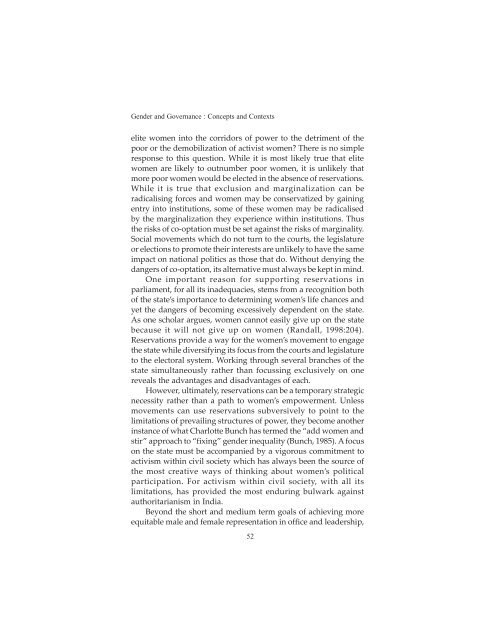Essays On Gender And Governance - United Nations Development ...
Essays On Gender And Governance - United Nations Development ...
Essays On Gender And Governance - United Nations Development ...
Create successful ePaper yourself
Turn your PDF publications into a flip-book with our unique Google optimized e-Paper software.
<strong>Gender</strong> and <strong>Governance</strong> : Concepts and Contexts<br />
elite women into the corridors of power to the detriment of the<br />
poor or the demobilization of activist women? There is no simple<br />
response to this question. While it is most likely true that elite<br />
women are likely to outnumber poor women, it is unlikely that<br />
more poor women would be elected in the absence of reservations.<br />
While it is true that exclusion and marginalization can be<br />
radicalising forces and women may be conservatized by gaining<br />
entry into institutions, some of these women may be radicalised<br />
by the marginalization they experience within institutions. Thus<br />
the risks of co-optation must be set against the risks of marginality.<br />
Social movements which do not turn to the courts, the legislature<br />
or elections to promote their interests are unlikely to have the same<br />
impact on national politics as those that do. Without denying the<br />
dangers of co-optation, its alternative must always be kept in mind.<br />
<strong>On</strong>e important reason for supporting reservations in<br />
parliament, for all its inadequacies, stems from a recognition both<br />
of the state’s importance to determining women’s life chances and<br />
yet the dangers of becoming excessively dependent on the state.<br />
As one scholar argues, women cannot easily give up on the state<br />
because it will not give up on women (Randall, 1998:204).<br />
Reservations provide a way for the women’s movement to engage<br />
the state while diversifying its focus from the courts and legislature<br />
to the electoral system. Working through several branches of the<br />
state simultaneously rather than focussing exclusively on one<br />
reveals the advantages and disadvantages of each.<br />
However, ultimately, reservations can be a temporary strategic<br />
necessity rather than a path to women’s empowerment. Unless<br />
movements can use reservations subversively to point to the<br />
limitations of prevailing structures of power, they become another<br />
instance of what Charlotte Bunch has termed the “add women and<br />
stir” approach to “fixing” gender inequality (Bunch, 1985). A focus<br />
on the state must be accompanied by a vigorous commitment to<br />
activism within civil society which has always been the source of<br />
the most creative ways of thinking about women’s political<br />
participation. For activism within civil society, with all its<br />
limitations, has provided the most enduring bulwark against<br />
authoritarianism in India.<br />
Beyond the short and medium term goals of achieving more<br />
equitable male and female representation in office and leadership,<br />
52

















